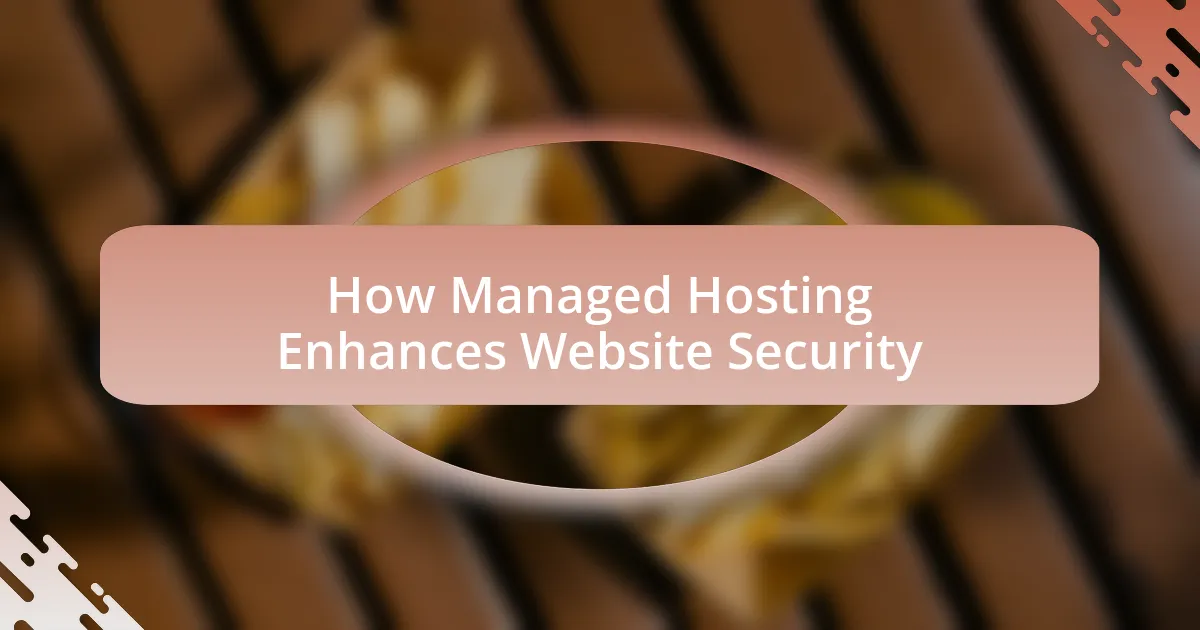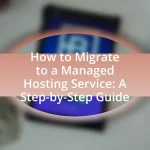Managed hosting is a service where a hosting provider manages the maintenance, security, and updates of servers for clients, significantly enhancing website security. This article outlines how managed hosting differs from traditional hosting, emphasizing the advanced security features it offers, such as firewalls, DDoS protection, and regular backups. It also discusses the importance of website security for businesses, the common threats they face, and the financial implications of security breaches. Furthermore, the article highlights the proactive measures managed hosting providers implement, such as continuous monitoring and dedicated security teams, to protect against cyber threats and maintain compliance with industry standards.
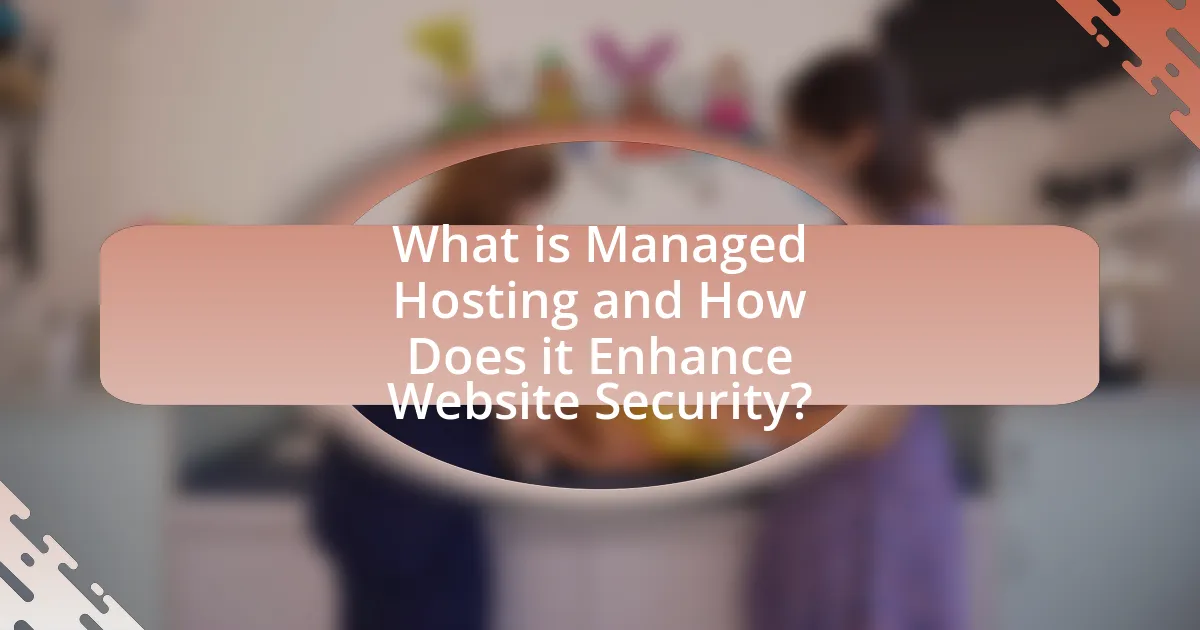
What is Managed Hosting and How Does it Enhance Website Security?
Managed hosting is a service where a hosting provider takes care of the management, maintenance, and security of a server or servers for a client. This type of hosting enhances website security by implementing advanced security measures such as firewalls, intrusion detection systems, and regular security updates, which are often beyond the capabilities of individual website owners. For instance, managed hosting providers typically offer 24/7 monitoring and support, ensuring that any potential security threats are identified and mitigated promptly. Additionally, they often include automated backups and disaster recovery solutions, which further protect against data loss and breaches. These comprehensive security features significantly reduce the risk of cyberattacks, making managed hosting a more secure option for businesses looking to safeguard their online presence.
How does managed hosting differ from traditional hosting?
Managed hosting differs from traditional hosting primarily in the level of support and management provided. In managed hosting, the service provider takes care of server management, maintenance, security, and updates, allowing businesses to focus on their core activities. In contrast, traditional hosting typically requires users to manage their own servers, including security measures and software updates, which can lead to vulnerabilities if not handled properly. This distinction is crucial, as managed hosting often includes enhanced security features, such as regular backups, monitoring, and proactive threat detection, which are not guaranteed in traditional hosting setups.
What security features are typically included in managed hosting services?
Managed hosting services typically include security features such as firewalls, DDoS protection, regular backups, malware scanning, and SSL certificates. Firewalls protect against unauthorized access, while DDoS protection mitigates distributed denial-of-service attacks, ensuring website availability. Regular backups safeguard data integrity, allowing for recovery in case of data loss. Malware scanning identifies and removes malicious software, enhancing overall security. SSL certificates encrypt data transmitted between the server and users, ensuring secure communications. These features collectively enhance the security posture of websites hosted on managed services, providing a robust defense against various cyber threats.
How does the management aspect contribute to enhanced security?
The management aspect contributes to enhanced security by implementing structured protocols and oversight that mitigate risks. Effective management ensures regular updates and patches to software, which is crucial as 60% of breaches occur due to unpatched vulnerabilities. Additionally, management establishes security policies and training for staff, reducing human error, which accounts for 95% of cybersecurity incidents. By prioritizing resource allocation for security measures and conducting regular audits, management creates a proactive security environment that significantly lowers the likelihood of breaches.
Why is website security crucial for businesses?
Website security is crucial for businesses because it protects sensitive data, maintains customer trust, and ensures compliance with regulations. A breach can lead to significant financial losses; for instance, the average cost of a data breach in 2023 was estimated at $4.45 million, according to IBM’s Cost of a Data Breach Report. Furthermore, compromised websites can damage a company’s reputation, resulting in lost customers and decreased revenue. Effective website security measures, such as SSL certificates and regular updates, are essential to safeguard against cyber threats and maintain operational integrity.
What are the common threats faced by websites today?
Common threats faced by websites today include malware attacks, phishing attempts, DDoS (Distributed Denial of Service) attacks, SQL injection, and cross-site scripting (XSS). Malware attacks can compromise website integrity and steal sensitive data, while phishing attempts deceive users into providing personal information. DDoS attacks overwhelm servers, causing downtime, and SQL injection exploits vulnerabilities in databases to manipulate data. XSS allows attackers to inject malicious scripts into web pages viewed by users. According to a report by Cybersecurity Ventures, cybercrime is projected to cost the world $10.5 trillion annually by 2025, highlighting the urgency for robust security measures against these threats.
How can security breaches impact a business’s reputation and finances?
Security breaches can severely damage a business’s reputation and finances by eroding customer trust and incurring significant costs. When a breach occurs, customers often lose confidence in the company’s ability to protect their sensitive information, leading to a decline in customer loyalty and potential loss of future sales. For instance, a study by IBM found that the average cost of a data breach in 2021 was $4.24 million, highlighting the financial impact on businesses. Additionally, companies may face legal penalties, regulatory fines, and increased insurance premiums, further straining their financial resources. The long-term effects can include a tarnished brand image, which can take years to rebuild, ultimately affecting market position and profitability.
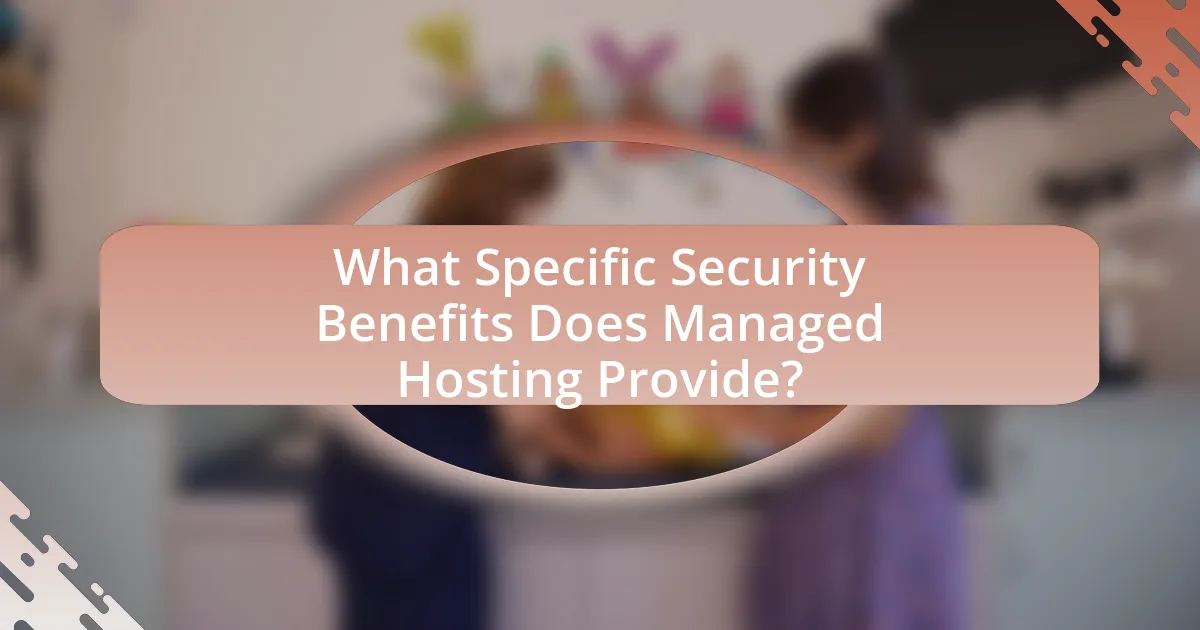
What Specific Security Benefits Does Managed Hosting Provide?
Managed hosting provides several specific security benefits, including enhanced data protection, regular security updates, and dedicated support. Enhanced data protection is achieved through advanced firewalls, intrusion detection systems, and data encryption, which safeguard sensitive information from unauthorized access. Regular security updates ensure that the hosting environment is equipped with the latest security patches, reducing vulnerabilities. Additionally, dedicated support teams monitor the server 24/7, allowing for rapid response to security incidents, which further mitigates risks. These measures collectively contribute to a more secure hosting environment compared to unmanaged solutions.
How does managed hosting ensure regular software updates and patches?
Managed hosting ensures regular software updates and patches through automated systems and dedicated support teams that monitor and maintain the server environment. These managed hosting providers implement scheduled updates to software applications and operating systems, ensuring that the latest security patches are applied promptly to mitigate vulnerabilities. For instance, a study by the Ponemon Institute found that organizations using managed hosting services experienced 50% fewer security breaches due to timely updates and proactive maintenance. This systematic approach not only enhances security but also reduces the risk of downtime associated with outdated software.
What role do updates play in maintaining website security?
Updates play a critical role in maintaining website security by patching vulnerabilities and enhancing system defenses. Regular updates to software, plugins, and frameworks address known security flaws that cybercriminals exploit; for instance, the 2020 WordPress vulnerability allowed attackers to compromise over 1.3 million sites, which was mitigated through timely updates. By ensuring that all components of a website are current, website owners significantly reduce the risk of breaches and unauthorized access, thereby safeguarding sensitive data and maintaining user trust.
How can automated updates reduce vulnerabilities?
Automated updates reduce vulnerabilities by ensuring that software and systems are consistently patched with the latest security fixes. This process minimizes the window of opportunity for attackers to exploit known vulnerabilities, as updates often address critical security flaws identified by developers. For instance, a report from the Cybersecurity and Infrastructure Security Agency (CISA) indicates that timely application of updates can prevent up to 85% of known exploits. By automating this process, organizations can maintain a robust security posture without the delays associated with manual updates, thereby significantly lowering the risk of breaches and data loss.
What are the advantages of having dedicated security teams in managed hosting?
Having dedicated security teams in managed hosting significantly enhances the protection of digital assets. These specialized teams provide continuous monitoring and rapid response to security threats, which reduces the risk of data breaches. According to a report by IBM, organizations with dedicated security teams can detect and respond to breaches 27% faster than those without. Furthermore, dedicated teams implement advanced security protocols and compliance measures, ensuring that managed hosting environments adhere to industry standards, such as GDPR and PCI DSS. This proactive approach not only safeguards sensitive information but also builds customer trust, as clients are more likely to engage with businesses that prioritize security.
How do security experts monitor and respond to threats?
Security experts monitor and respond to threats by utilizing a combination of advanced technologies, real-time data analysis, and established protocols. They employ tools such as intrusion detection systems (IDS) and security information and event management (SIEM) systems to continuously analyze network traffic and identify anomalies that may indicate a security breach. For instance, according to a report by the Ponemon Institute, organizations that implement SIEM solutions can reduce the time to detect and respond to threats by up to 50%. Additionally, security experts follow incident response plans that outline specific steps to take when a threat is detected, ensuring a swift and organized reaction to mitigate potential damage.
What proactive measures do managed hosting providers implement?
Managed hosting providers implement proactive measures such as regular security audits, automated backups, and real-time monitoring to enhance website security. Regular security audits identify vulnerabilities and ensure compliance with security standards, while automated backups protect data integrity by allowing quick recovery in case of data loss. Real-time monitoring detects suspicious activities and potential threats, enabling immediate response to security incidents. These measures collectively reduce the risk of breaches and ensure a secure hosting environment for clients.
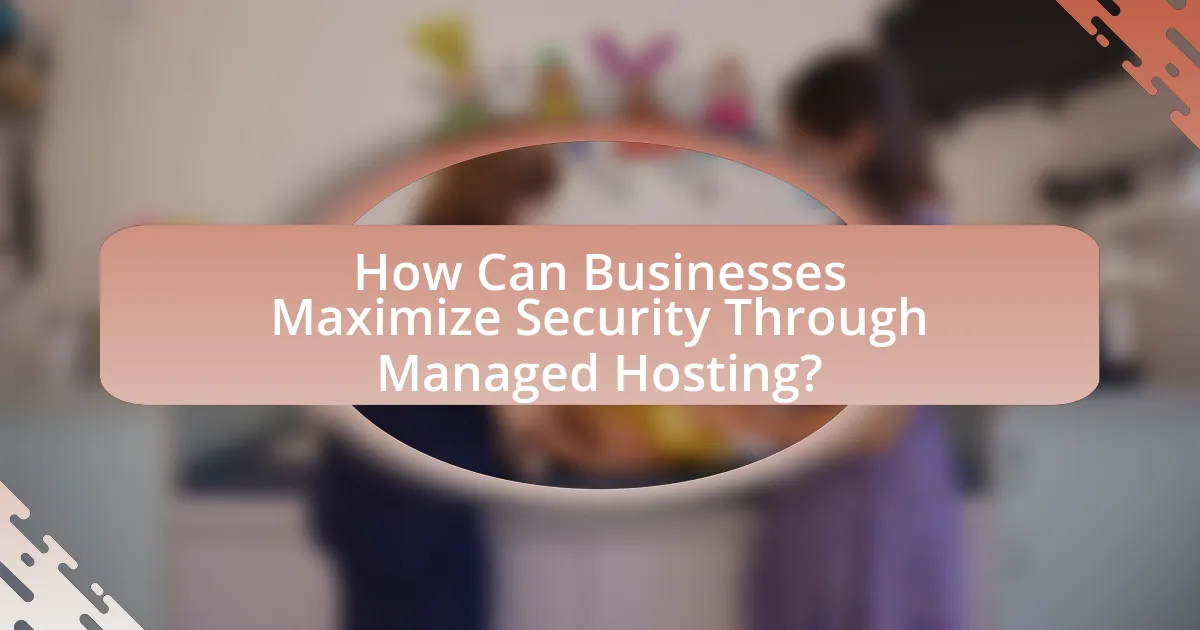
How Can Businesses Maximize Security Through Managed Hosting?
Businesses can maximize security through managed hosting by leveraging dedicated resources, expert management, and advanced security protocols. Managed hosting providers typically offer tailored security solutions, including firewalls, intrusion detection systems, and regular security audits, which significantly reduce vulnerabilities. For instance, a study by the Ponemon Institute found that organizations using managed hosting services experienced 50% fewer security breaches compared to those managing their own infrastructure. Additionally, managed hosting often includes automatic updates and patch management, ensuring that systems are protected against the latest threats. This proactive approach to security, combined with 24/7 monitoring by experienced professionals, enhances overall security posture and minimizes risks associated with cyber threats.
What best practices should businesses follow when choosing a managed hosting provider?
Businesses should prioritize security features, support quality, and scalability when choosing a managed hosting provider. Security features such as DDoS protection, firewalls, and regular backups are essential to safeguard sensitive data. Quality support, including 24/7 availability and expertise in handling security incidents, ensures prompt resolution of issues. Scalability allows businesses to adapt to changing demands without compromising security. According to a 2021 report by Cybersecurity Ventures, global cybercrime costs are projected to reach $10.5 trillion annually by 2025, highlighting the importance of robust security measures in hosting solutions.
What certifications and compliance standards should be considered?
Certifications and compliance standards that should be considered include ISO 27001, PCI DSS, HIPAA, and GDPR. ISO 27001 establishes requirements for an information security management system, ensuring that organizations manage sensitive data securely. PCI DSS is crucial for any business that handles credit card transactions, as it sets security standards to protect cardholder information. HIPAA is essential for healthcare organizations, ensuring the protection of patient data. GDPR governs data protection and privacy for individuals within the European Union, mandating strict compliance for organizations handling personal data. These standards collectively enhance website security by providing frameworks for risk management and data protection.
How can businesses assess the security features of different providers?
Businesses can assess the security features of different providers by conducting a thorough evaluation of their security protocols, certifications, and incident response capabilities. This assessment should include reviewing compliance with industry standards such as ISO 27001, SOC 2, and GDPR, which indicate a commitment to data protection and security best practices. Additionally, businesses should analyze the provider’s security measures, including encryption methods, firewall protections, and intrusion detection systems, to ensure they align with their specific security needs. Furthermore, examining customer reviews and case studies can provide insights into the provider’s reliability and effectiveness in handling security incidents.
What ongoing security measures should businesses implement alongside managed hosting?
Businesses should implement ongoing security measures such as regular security audits, continuous monitoring, and robust data encryption alongside managed hosting. Regular security audits help identify vulnerabilities and ensure compliance with industry standards, while continuous monitoring allows for real-time detection of threats, reducing response time to incidents. Robust data encryption protects sensitive information both in transit and at rest, safeguarding against unauthorized access. According to a report by the Ponemon Institute, organizations that conduct regular security audits reduce the risk of data breaches by up to 50%.
How can regular security audits enhance overall website security?
Regular security audits enhance overall website security by identifying vulnerabilities and ensuring compliance with security standards. These audits systematically evaluate the website’s infrastructure, applications, and data handling practices, allowing organizations to detect weaknesses before they can be exploited by attackers. For instance, a study by the Ponemon Institute found that organizations conducting regular security audits experienced 50% fewer data breaches compared to those that did not. By proactively addressing security gaps, businesses can significantly reduce the risk of cyber threats and protect sensitive information.
What role does employee training play in maintaining security?
Employee training plays a critical role in maintaining security by equipping staff with the knowledge and skills necessary to recognize and respond to security threats. Trained employees are more likely to identify phishing attempts, adhere to security protocols, and utilize secure practices, thereby reducing the risk of data breaches. According to a report by the Ponemon Institute, organizations that invest in security awareness training can reduce the likelihood of a security incident by up to 70%. This demonstrates that effective employee training is essential for fostering a security-conscious culture and enhancing overall organizational security.
What are the common misconceptions about managed hosting and website security?
Common misconceptions about managed hosting and website security include the belief that managed hosting guarantees complete security and that it is only suitable for large businesses. Managed hosting does enhance security through dedicated resources, regular updates, and expert management, but it does not eliminate all risks, as vulnerabilities can still arise from user actions or third-party applications. Additionally, while managed hosting is beneficial for larger enterprises due to their complex needs, small and medium-sized businesses can also leverage its advantages to improve their security posture. According to a report by the Ponemon Institute, 60% of small businesses that experience a cyber attack go out of business within six months, highlighting the importance of robust security measures that managed hosting can provide.
How can businesses differentiate between myths and facts regarding managed hosting security?
Businesses can differentiate between myths and facts regarding managed hosting security by conducting thorough research and consulting credible sources. For instance, many myths suggest that managed hosting is inherently less secure than on-premises solutions; however, studies show that managed hosting providers often implement advanced security measures, such as regular updates, firewalls, and intrusion detection systems, which can exceed the capabilities of many in-house setups. Additionally, businesses should evaluate case studies and industry reports that highlight the security performance of managed hosting services, such as the 2021 Cloud Security Report by Cybersecurity Insiders, which indicates that 93% of organizations using managed hosting reported improved security postures. By relying on verified data and expert opinions, businesses can effectively distinguish between misconceptions and the realities of managed hosting security.
What should businesses know about the limitations of managed hosting security?
Businesses should know that managed hosting security has limitations, including reliance on the provider’s security measures and potential vulnerabilities in shared environments. Managed hosting services often implement robust security protocols, but businesses remain responsible for their own data security practices, such as ensuring strong passwords and regular software updates. Additionally, in shared hosting environments, vulnerabilities in one client’s setup can potentially affect others, highlighting the importance of choosing a reputable provider with strong isolation measures. According to a 2021 study by the Ponemon Institute, 60% of organizations reported experiencing a data breach due to third-party vulnerabilities, emphasizing the need for businesses to remain vigilant even when utilizing managed hosting solutions.
What practical steps can businesses take to enhance their website security with managed hosting?
Businesses can enhance their website security with managed hosting by implementing regular security audits, utilizing firewalls, and ensuring timely software updates. Regular security audits help identify vulnerabilities, allowing businesses to address potential threats proactively. Firewalls act as a barrier between the website and malicious traffic, significantly reducing the risk of attacks. Timely software updates are crucial, as they patch known vulnerabilities and enhance overall security. According to a report by the Ponemon Institute, organizations that conduct regular security assessments can reduce the risk of data breaches by up to 50%.
